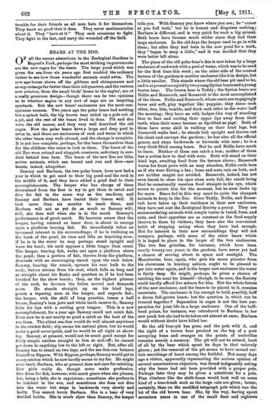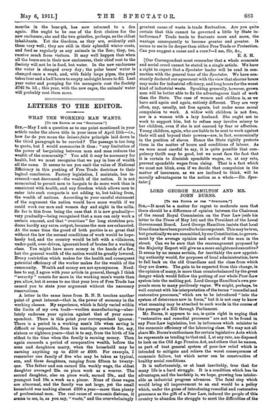BEARS AT THE ZOO.
OF all the recent alterations in the Zoological Gardens in Regent's Park, perhaps the most striking improvements are the new cages for the bears. The large pond which was given the sea-lions six years ago first enabled the ordinary visitor to see how those wonderful animals could swim. The new ape-house shows off the gibbons and chimpanzees and orang-outangs far better than their old quarters, and the various new aviaries, from the small birds' house to the eagles', are of a really generous design—though there can be two opinions as to whether eagles in any sort of cage are an inspiring spectacle. But the new bears' enclosures are the most con- spicuous success. Two years ago the polar bears had nothing but a splash bath, the big brown bear toiled up a pole out of a pit, and the rest of the bears lived in dens. Pit and den were the old names, and they very well described the old cages. Now the polar bears have a large and deep pool to swim in, and there are enclosures of rock and water in which the other bears may walk abroad, and the change is complete. It is not less complete, perhaps, for the bears themselves than for the children who come to look at them. The bears of the old Zoo were rotund and sluggish creatures, sedentary in saw- dust behind iron bare. The bears of the new Zoo are lithe, active animals, which can bound and run and dive—new beasts, indeed, altogether.
Sammy and Barbara, the two polar bears, have now had a year in which to get used to their big pond and the rock in the middle of it, and they have added a good deal to their accomplishments. The keeper who has charge of them determined from the first to try to get them to catch and dive for fish in the same way as the sea-lions, and Sammy and Barbara have learnt their lesson well. It took more than six months to teach them, and Barbara will not as yet do as much as Sammy will ; still, she does well when she is in the mood. Sammy's performance is of great merit. He becomes aware that the keeper, having entered an inner door, is about to emerge upon a platform bearing fish. He immediately takes an increased interest in his surroundings ; if he is reclining on the bank of the pond, he rises and lifts an inquiring nose ; if he is in the water he may perhaps stand upright and wave his head ; his neck appears a little longer than usual. The keeper, bearing fish, walks out upon a platform above the pond; then a portion of fish, thrown from the platform, descends with an encouraging smack upon the rock below. Sammy, hearing the smack, uprears his vast bulk to the rock; waters stream from his coat, which falls as long and as straight about his flanks and quarters as if he had been brushed for the show bench ; then, on the highest plateau of the rock, he devours the fallen morsel and demands more. He stands straight up on his hind legs, points a tapering nose at the keeper, and expects fish ; the keeper, with the skill of long practice, tosses a half bream, Sammy's lean jaws and white teeth receive it; Sammy licks his lips with a curling grey tongue. This is a new accomplishment, for a year ago Sammy could not catch fish. Even now he is not nearly so good a catch as the best of the sea-lions. The ablest sea-lion would do well almost anywhere in the cricket field ; slip seems his natural place, but he would make a good cover-point, and he would be all right at short- leg. Sammy, at present, would not be much good except for fairly simple catches straight to him at mid-off ; he cannot get down to anything low to the left or right. But, after all, Sammy has to stand on two legs, and the sea-lion can balance himself on flippers. With flippers, perhaps, Sammy would get to many catches which he now hardly seems to try for. He might even teach Barbara, who at present does not care for catching. Few girls really do, though some make profession. She dives for fish, however, with much grace when she pleases, but, being a lady, she is capricious ; sometimes she prefers to be indolent in the sun, and sometimes she does not dive into the water but steps in backwards very slowly and lazily. You cannot hurry Barbara. She is a bear of very decided habits. She is much slyer than Sammy, the keeper tells you. With Sammy you know where you are ; he " comw at you full butt," but he is honest and disguises nothing ; Barbara is different, and is very quick for such a big animal. Both bears have become much wilder since they had their large enclosure. In the old days the keeper used to go in with them ; but after they had been in the new pond for a week, they "began to snap a little," and it was decided that they were better left alone.
The place of the old polar bear's den is now taken by a large enclosure of rockwork with a pool of water, which was to be used for the first time this week ; on the other side of the central terrace of the gardens is another enclosure like it in design, but a little smaller. This stands where the old bear pit used to be, and is atpresent occupied by twoyoung Syrian bears and a young brown bear. The brown bear is Teddy; the Syrian bears are Nellie and Roosevelt, and Roosevelt is the most accomplished of the three. Nellie and Roosevelt, whose coats are engagingly loose and soft, play together like puppies ; they chase each other, box, bite, tumble, and duck each other in the water half the morning; they have an odd, badger-like way of standing face to face and curling their upper lips away from their teeth, when their noses become as tip-tilted as pigs'. Both of them have some skill in walking on their hind legs, but Roosevelt walks best ; he stands bolt upright and throws out his chest and surveys the gardens ; he has also all the official graces, and steps backwards or forwards with ease ; he is a very Gold Stick among bears. But he and Nellie have much to learn. Neither of them can catch a bun; neither of them has a notion how to deal with nuts. Both will stand on their hind legs, awaiting food from the terrace above ; Roosevelt waves his front paws with an easy abandon, Nellie curls hers as if she were flirting a fan ; buns and nuts rain on both, and are neither caught nor avoided. Roosevelt, indeed, has not even learnt to close his eyes when nuts fall, the result being that he occasionally receives food straight in his eye, which seems to puzzle him for the moment, but he soon looks up for more. Bears fed in this way must be quite the cheapest animals to keep in the Zoo. Since Teddy, Nellie, and Roose- velt have taken up their residence in their new enclosure, they have not cost the Zoological Society a penny. They are accommodating animals with simple tastes in bread, buns, and nuts, and their appetites are as constant as the food supply thrown to them by visitors; they have also the convenient habit of stopping eating when they have had enough. But for interest in their new surroundings they will not compare, perhaps, with some of the other bears which it is hoped to place in the larger of the two enclosures. The two fine grizzlies, for instance, which have been nearly twenty-one years in the gardens, have never yet had a chance of moving about in space and sunlight. The Manchurian bear, again, who gets his name piscator from his cleverness in hunting salmon, ought to be pleased to get into water again, and in the larger new enclosure the water is fairly deep. He might, perhaps, be given a chance of catching his meal for himself—though, to be sure, the Society could hardly afford live salmon for him. But the whole future of the new enclosure, and the bears to be placed in it, remains uncertain. The enclosure is big enough to hold, possibly, half a dozen full-grown bears; but the question is, which can be trusted together? Separation in cages is not the best pre- paration for joint life in a large enclosure. One of the half. bred polars, for instance, was introduced to Barbara in her new pond, but she had to be out almost at once; Barbara would without doubt have killed her.
So the old bear-pit has gone, and the pole with it, and the sight of a brown bear perched on the top of a post accepting buns and oranges on the points of umbrellas remains merely a memory. The pit will not be missed, least of all by the bear which spent its days in that unlovely gloom ; yet the removal of the pit seems to have caused cer- tain searchings of heart among the faithful. Not many days ago a visitor, apparently representing the serious opinion of several conscientious objectors, was found indignantly asking why the bears had not been provided with a proper pole. Perhaps later they may be given a substitute for a pole. Fine climbers like the sloth-bears would look well on some kind of a tree-trunk such as the large cats are given; better, certainly, than on the modified telegraph pole which was the lot of the old brown bear. She, by the way, having spent seventeen years in one of the small dens and 'eighteen
months in the bear-pit, has now returned to a den again. She ought to be one of the first choices for the new enclosure ; she and the two grizzlies, perhaps, as the oldest inhabitants. Yet the Gardens, as they are, evidently snit them very well ; they are still in their splendid winter coats, and feed as regularly as any animals in the Zoo ; they, too, receive much from visitors. It may well happen that when all the bears are in their new enclosures, their chief cost to the Society will not be in food, but water. In the new enclosures the water is changed every day ; the polar bears' water is changed once a week, and, with fairly large pipes, the pond takes four and a half hours to empty and eight hours to fill. Last year water and pumping for the menagerie cost the Society £742 Ss. 5d. ; this year, with the new cages, the animals' water will probably cost them more.











































 Previous page
Previous page